
Quake III Arena is a 1999 multiplayer-focused first-person shooter developed by id Software. The third installment of the Quake series, Arena differs from previous games by excluding a story-based single-player mode and focusing primarily on multiplayer gameplay. The single-player mode is played against computer-controlled bots. It features music composed by Sonic Mayhem and Front Line Assembly founder Bill Leeb.

Soulcalibur is a 1998 fighting game developed and published by Namco. It is the second game in the Soulcalibur series, preceded by Soul Edge. Originally released in arcades on July 30, 1998, it ran on the Namco System 12 hardware, and was ported to the Dreamcast console in 1999 with new features and improved graphics.
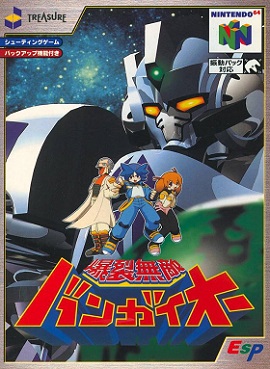
Bangai-O is a multidirectional shooter developed by Treasure and released in 1999 on the Nintendo 64 in Japan. It was ported to the Dreamcast worldwide shortly after with some gameplay changes and updated graphics and audio. The game places the player in control of a weaponized mech that can hover across large stages and fire at enemies all around them. The player must reach the end of each stage and defeat the boss, while avoiding hazards scattered across the map such as enemy mechs and gun turrets.

Phantasy Star Online is an online role-playing game (RPG) developed by Sonic Team and published by Sega in 2000 for the Dreamcast. It was the first successful online RPG for game consoles; players adventure with up to three others over the internet to complete quests, collect items and fight enemies in real-time action RPG combat. The story is unrelated to previous games in the Phantasy Star series.

Yu Suzuki is a Japanese game designer, producer, programmer, and engineer, who headed Sega's AM2 team for 18 years. Considered one of the first auteurs of video games, he has been responsible for a number of Sega's arcade hits, including three-dimensional sprite-scaling games that used "taikan" motion simulator arcade cabinets, such as Hang-On, Space Harrier, Out Run and After Burner, and pioneering polygonal 3D games such as Virtua Racing and Virtua Fighter, which are some of the games besides others from rival companies during that era credited with popularizing 3D graphics in video games; as well as the critically acclaimed Shenmue series. As a hardware engineer, he led the development of various arcade system boards, including the Sega Space Harrier, Model 1, Model 2 and Model 3, and was involved in the technical development of the Dreamcast console and its corresponding NAOMI arcade hardware.
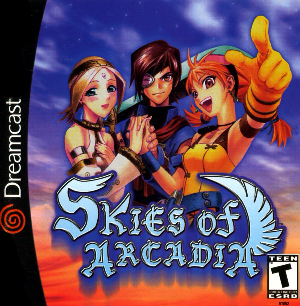
Skies of Arcadia is a 2000 role-playing video game developed by Overworks and published by Sega for the Dreamcast. Players control Vyse, a young air pirate, and his friends as they attempt to stop the Valuan Empire from reviving ancient weapons with the potential to destroy the world.
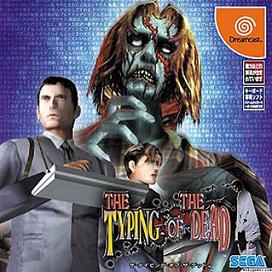
The Typing of the Dead is an arcade game that was developed by WOW Entertainment and published by Sega for the NAOMI hardware. The game was released in Japanese arcades in 1999 and was ported to the Sega Dreamcast in 2001 by Smilebit. A Microsoft Windows version was released in 2000 and a PlayStation 2 port followed in 2004.
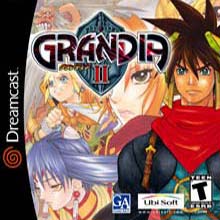
Grandia II is a role-playing video game developed by Game Arts originally for the Dreamcast console as part of their Grandia series. Initially released in Japan by Game Arts in August 2000, the game was published by Ubi Soft in North America in December 2000 and in Europe in February 2001. Grandia II was later ported to PlayStation 2, where it was released worldwide throughout 2002, and for Windows exclusively in North America and Europe later that year.
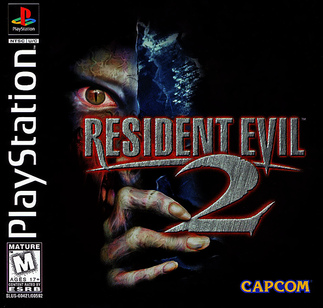
Resident Evil 2 is a 1998 survival horror video game developed and published by Capcom for the PlayStation. The player controls rookie cop Leon S. Kennedy and college student Claire Redfield, who must escape Raccoon City after its citizens are transformed into zombies by a biological weapon two months after the events of the original Resident Evil. The gameplay focuses on exploration, puzzles, and combat; the main difference from its predecessor are the branching paths, with each player character having unique storylines, partners and obstacles.

Twinkle Star Sprites is a competitive vertically scrolling shooter arcade video game created by ADK and published by SNK in 1996. It was ADK's last production for the Neo Geo. Two players are each in separate, side-by-side, vertically scrolling levels. Combinations of shots and timed power-ups damage the other player. These attacks also serve as counters to the opponent's attack.

The Ring: Terror's Realm is a survival horror video game developed and published by Asmik Ace Entertainment in Japan and published by Infogrames North America in North America. It was released for Dreamcast on February 24, 2000 in Japan and September 26 in North America. It is based on the Ring series of novels by Japanese author Koji Suzuki, which also inspired the Japanese film Ring (1998) and its American remake, The Ring (2002).

F-1 World Grand Prix, developed by Paradigm Entertainment, is a Formula One racing game/sim first released in 1998 for the Nintendo 64 game console and to later platforms including the Sega Dreamcast, Microsoft Windows, Sony PlayStation, and Game Boy Color. The Nintendo 64 version is based on the 1997 Formula One season, featuring each of the 17 circuits from the season and all 22 drivers, with the exceptions of Jacques Villeneuve and the MasterCard Lola team.

Famista 64, also known as Family Stadium 64, is a 1997 baseball video game developed and published in Japan by Namco for the Nintendo 64. Controlling one of fourteen selectable teams, both real-world and fictional, the player must score more runs than the opposing team by pitching, batting and catching the ball, as in real baseball. It is the twelfth entry in the Family Stadium series, serving as a 3D remake of the original Pro Baseball: Family Stadium.

Rent A Hero is an action role-playing video game series released by Sega for the Mega Drive console in 1991 with a large emphasis on humor. The game features the same graphic engine previously used in the development of Sword of Vermilion. However, Rent A Hero has an unusual innovation for the genre. Instead of using standard turn-based battles, fights are in a similar format to 2D fighting games.

Segagaga is a 2001 role-playing simulation video game developed by Hitmaker and published by Sega for the Dreamcast in Japan. Described as a "Sega simulation", the player takes control of Sega Tarō, who must help save a struggling Sega from losing to its rival DOGMA, who owns 97% of the console market. Gameplay involves battling employees and other characters throughout various Sega development studios, some being taken from older Sega game franchises. It features many tongue-in-cheek references to Sega and the video game industry, particularly Sony Computer Entertainment and its PlayStation 2 console.

Dinosaur is a 2000 video game published by Ubi Soft. It is based on the 2000 animated film of the same name.
The 1990s was the third decade in the industry's history. It was a decade of marked innovation in video gaming. It was a decade of transition from sprite-based graphics to full-fledged 3D graphics and it gave rise to several genres of video games including, but not limited to, the first-person shooter, real-time strategy, survival horror, and MMO. Arcade games, although still very popular in the early 1990s, began to decline as home consoles became more common. The fourth and fifth generation of video game consoles went on sale, including the Sega Genesis, Super Nintendo, Sega Saturn, PlayStation, Nintendo 64, Game Boy Color and the Sega Dreamcast. Notable games released in the 1990s included Super Mario World, Sonic the Hedgehog, Street Fighter II, Mortal Kombat, Tekken 3,Doom, Wolfenstein 3D, Quake, Duke Nukem 3D, Final Fantasy VII, Unreal Tournament, Star Fox, Half-Life, Grand Theft Auto, Super Mario 64, Pokémon Red and Blue, NBA Jam,Daytona USA, GoldenEye 007, System Shock 2, Civilization,Ridge Racer, Sonic Adventure, Gran Turismo, Super Mario Kart, Pokémon Gold and Silver,Castlevania: Symphony of the Night, Super Metroid, Silent Hill, Dead or Alive 2, The Legend of Zelda: Ocarina of Time, Crash Bandicoot, Spyro The Dragon, Fallout, Metal Gear Solid, Diablo, Virtua Fighter, Tomb Raider,Sega Rally Championship, Wing Commander,Super Smash Bros, Secret of Mana,Thief: The Dark Project, Age of Empires, Nights into Dreams, Panzer Dragoon, Gunstar Heroes, EverQuest, Chrono Trigger, Battletoads, Worms, Myst, Micro Machines, Streets of Rage 2,Baldur's Gate,Donkey Kong Country, Wipeout, The Legend of Zelda: A Link to the Past, Super Mario Land 2: 6 Golden Coins,Lemmings, EarthBound, StarCraft, Banjo-Kazooie, PaRappa the Rapper, Resident Evil, Tony Hawk's Pro Skater, Soulcalibur, Command & Conquer, and Dance Dance Revolution.

Spirit of Speed 1937 is a racing video game developed by Broadsword Interactive. The game was originally released in 1999 exclusively in Europe by Hasbro Interactive, who released the game under the MicroProse brand name. In 2000, the game was ported to the Dreamcast, and was published by Acclaim Entertainment under the LJN banner, the final game published with this label, five years after LJN was shut down by Acclaim. This version saw a North American release, and was released there on June 27, 2000. Spirit of Speed 1937 takes place in 1937, when motorsport was in its infancy.

Le Mans 24 Hours is a video game released for the PlayStation, Game Boy Color, Dreamcast, PlayStation 2, and Microsoft Windows. The Dreamcast version was ported and published by Sega in Japan on 15 March 2001, while the PlayStation 2 version was ported and published by the same company on 13 June. Based on the famous 24 hours of Le Mans race in France, the player is invited to race the entire 24-hour endurance course or take part in a simpler arcade mode. The game also featured tracks such as Bugatti Circuit, Brno Circuit, Road Atlanta, Suzuka Circuit, Donington Park and Circuit de Catalunya, as well as a weather and night system.

Rainbow Cotton is a 2000 rail shooter video game developed and published by Success exclusively for the Dreamcast. The fifth installment in the Cotton franchise, it is a follow-up to Panorama Cotton (1994) and the first 3D entry in the series. In the game, players assume the role of the titular young witch who, alongside her fairy companion Silk, sets out on her broomstick on a quest to defeat the evil demon Tweed and retrieve a stolen Willow candy from York Country. Its gameplay is similar to Panorama Cotton, consisting of shooting mixed with role-playing game elements while flying through 3D environments on a predetermined track.



















